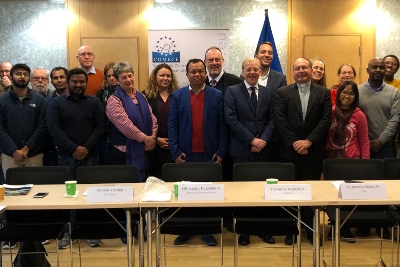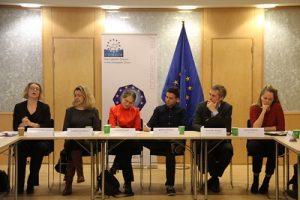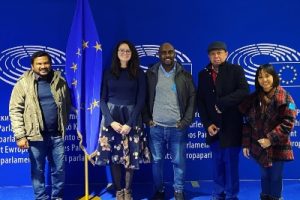Des organisations d’inspiration catholique se sont réunies pour discuter des chaînes de valeur mondiales et promouvoir des idées motivées par l’enseignement social catholique (13 Février 2020, Bruxelles)

Traduire:
CIOs gathered to discuss GVCs and promoting ideas inspired by CST
In November of 2018, the Catholic Inspired Organizations (CIOs) network convened and identified two topic areas for special attention from the network in Brussels, Belgium. For over a year, the two topics, Global Value Chains (GVCs) and Catholic Social Teaching (CST) have been evaluated from the different grassroots connections of the CIOs. On January 27-28, 2020, the CIOs came back together to share and discuss these two topics areas, as it is their connection to every corner of the world which brings a unique perspective and is so valuable to the wider network. Aimed at contributing to the ILO Centenary and the Sustainable Development Goals in a meaningful way, “The Future of Work, Labour After Laudato Si” project is the result of the CIOs network’s efforts. It is through the network’s collaboration and meetings like this one where Laudato Si can be brought to life through discussion with the long-term goal of effective implementation.
The 2020 meeting was opened by remarks by Fr. Manuel Enrique Barrios Prieto, General-Secretary of the Commission of the Bishops’ Conferences of the European Union (COMECE), and segued into the first session provided by Prof. Paul H. Dembinski who illustrated, through an economic assessment, the growing concern involving the dignity of the worker, enterprises, and the future of labour within the GVCs model. Here, Prof. Dembinski, Director of the Fondation l’Observatoire de la Finance (OBSFIN) addressed the need for better data from within the supply chain, discussed the meaning of digitalization and automation for job creation, and offered insight on labour markets ranging from agriculture to fishing. The second session summarized CST by Fr. Martin Maier, SJ Secretary, Jesuit European Social Centre (JESC) and Spiritual Director for International Christian Union of Business Executives (UNIAPAC) who reiterated the future of human work, community, and our common home are the heart of Laudato Si whose focal tripartite of “planet – social justice – future of humanity” and cannot be considered separately from innovation. The group discussed the coalesce of global value chains with the application of CST to these increasingly problematic questions.
The second day began with a public event that included a panel debate on “Reshaping the Future of Work in GVCs in connection with ILO Resolution concerning Decent work in global supply chains”. This panel was moderated by Ignacio Alonso Alasino, Project Manager at the International Catholic Migration Commission (ICMC) and brought stimulating discussion lead by Sarah Prenger, International President of the International Young Christian Workers (IYCW); and included Benedikt Bunker of the European Commission, Zuzanna Muskat-Gorska of International Trade Union Confederation (ITUC); Laura Eliaerts of the Confederation of Christian Trade Unions in Belgium (CSC-ACV); and Audrey Le Guevel of the International Labour Office in Brussels (ILO).
This panel examined the role of religious leaders and how to change attitudes among religious; what initiatives are being taken by social partners, civil society actors, and what advocacy tools are being employed; which lead to a discussion regarding issues within the global supply chain and observations of violations against laborers rights. Their analysis proposed strategies, some already in place, for improvement from an international legal perspective such as: essential access to collective bargaining, businesses and human rights recognition before European institutions, and sexual harassment protection for women in the workplace. Still, most of the initiatives were driven out of concepts of social justice, the dignity of the worker, and global value chains and returned to the importance of legal accountability among big businesses who benefit greatly from activity within global value chains.

The panel debate was followed by a dialogue called “Reinforcing the essential Catholic Social Teaching in the world of work for the care of human dignity” and moderated by Hildegard Hagemann of Justice and Peace Germany. This dialogue included input from Josianne Gauthier from Coopération International pour le Développment et la Solidarité (CIDSE); Maryana Hnyp from Catholic University of Leuven; and Fr. Martin Maier, SJ provided real world perspectives, theological insight, and academic research to broach the concept of expanding Christian Social Thinking (CST) in our modern world. Attendees were invited into the dialogue through the Catholic Church’s recommended inclusive philosophical moral approach to justice of “See, Judge, and Act”. It was suggested too that “listening” should be added to this CST mantra, as we must listen to know the needs of others. Listening then becomes an act of humility and allows us to see the way forward and create real solutions.
The two days concluded with CIOs having a more comprehensive understanding of the future of work for the young, the elderly, the woman, the migrant worker, or the human worker, in general, and from where problems may stem within the cracks of the GVCs. In Catholic social justice tradition and economic terms, CIOs now have a better understanding of the scale of the tasks that lie ahead.
After the CIO public meeting ended, several attendees walked from the COMECE to the European Parliament located nearby for an Article 17 dialogue on the proposed Green Deal. A highly relevant conversation for the CIO network, and in a world post Laudato Si, to be present for a gathering of European officials and religious leaders from all traditions to voice their opinions on the EU’s position on the world’s ecological crisis and Europe’s role in it.
While the European Green Deal: Preserving our Common Home (Article 17 TFEU) was live-streamed across the European Union, attendees of this event were greeted with an opening address by Margaritis Schinas, Vice-President of the European Commission, Promoting our European Way of Life, and the meeting was overseen by Mairead McGuinness, First Vice-President of the European Parliament, Responsible for the Parliament’s implementation of Article 17 TFEU.
The first panel, A Just Transition for all Europeans, kicked-off with a discouraging presentation by Eva Jensen, Head of Climate Change, Energy and Transport at the European Environment Agency who shared the science behind the Green Deal’s goals and the speed at which policies reflecting carbon neutral energy consumption need to occur in order to reach the 1.5 degree Celsius temperature limit set by the 2016 Paris Agreement. The second panel was on the topic of Europe’s Responsibilities in the Wider World. The overall dialogue brought meaningful contributory queries from the CIOs in attendance including Sarah Prenger, Ludovicus Mardiyono, CIOs Coordinator in The Future of Work, Labour After Laudato Si; and Tara McClanahan, Pax Romana Extern with ICMC. In the end, the event will serve as a timely starting point for CIOs as the Catholic Church turns to a new focus with the next Synod to meet on the climate.


